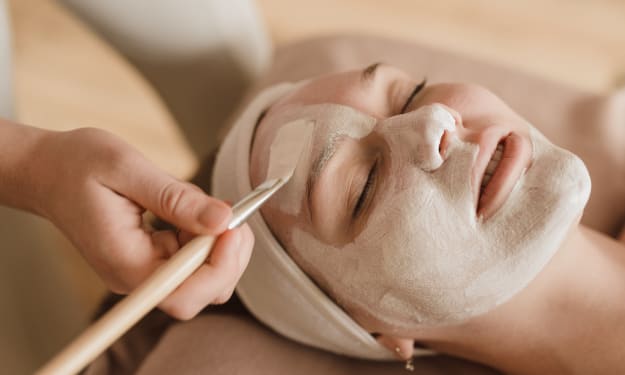Unlocking the Secrets of Glowing Skin
A Comprehensive Guide to Skincare

Beautiful and healthy skin is a sign of good health and overall well-being. Taking care of your skin can boost your confidence and improve your appearance. But with so many skincare products and routines out there, it can be overwhelming to figure out what works best for your skin type. In this article, we'll explore the secrets to achieving glowing skin, from the basics of skincare to the latest trends in the industry.
Understanding Your Skin:
Before we dive into the specifics of skincare routines and products, it's important to understand the basics of your skin. The skin is the largest organ in your body, and it's responsible for protecting your body from external factors such as bacteria, UV radiation, and pollution. The skin is made up of three layers: the epidermis, dermis, and subcutaneous tissue.
The epidermis is the outermost layer of the skin and is responsible for protecting the skin from environmental factors. The dermis is the middle layer and contains the hair follicles, sweat glands, and collagen fibers. The subcutaneous tissue is the deepest layer and is responsible for cushioning the skin and regulating body temperature.
Skin Types:
There are five main skin types: normal, oily, dry, combination, and sensitive. Understanding your skin type is crucial in determining the best skincare routine and products for you.
Normal skin is neither too oily nor too dry and has a balanced pH level. Oily skin produces excess sebum, which can lead to acne and breakouts. Dry skin lacks moisture and can lead to flakiness and itchiness. Combination skin is a combination of oily and dry skin, where some areas of the skin are oily while others are dry. Sensitive skin is prone to irritation, redness, and inflammation.
The Basics of Skincare:
The basics of skincare involve three simple steps: cleansing, toning, and moisturizing. Cleansing helps to remove dirt, oil, and makeup from your skin, while toning helps to balance your skin's pH level and tighten your pores. Moisturizing helps to keep your skin hydrated and prevent dryness and flakiness.
Cleansing:
When it comes to cleansing, it's important to choose a cleanser that's suitable for your skin type. If you have oily skin, opt for a gel or foaming cleanser that can help to remove excess sebum. If you have dry skin, go for a cream or lotion cleanser that can help to add moisture to your skin.
Toning:
Toning is often overlooked but is an essential step in any skincare routine. Toners help to remove any residual dirt and oil from your skin and restore your skin's pH level. Look for toners that are alcohol-free and contain natural ingredients such as witch hazel, rosewater, or aloe vera.
Moisturizing:
Moisturizing is the final step in any skincare routine and helps to keep your skin hydrated and supple. Choose a moisturizer that's suitable for your skin type and contains ingredients such as hyaluronic acid, ceramides, and glycerin.
Sun Protection:
Sun protection is also an important aspect of skincare. Overexposure to the sun's UV rays can lead to skin damage, premature aging, and even skin cancer. Use a broad-spectrum sunscreen with an SPF of 30 or higher and apply it generously to all exposed areas of your skin.
Advanced Skincare:
In addition to the basics of skincare, there are also advanced skincare treatments and products that can help to improve your skin's appearance and health.
Chemical Peels:
Chemical peels involve applying a chemical solution to your skin to exfoliate the top layer of skin and promote cellregeneration. They can help to improve skin texture, reduce the appearance of fine lines and wrinkles, and minimize dark spots and acne scars. Chemical peels can be done at home with over-the-counter products or at a dermatologist's office for more intensive treatment.
Serums:
Serums are lightweight, fast-absorbing liquids that contain high concentrations of active ingredients such as antioxidants, vitamins, and peptides. They can help to address specific skin concerns such as dullness, dark spots, and fine lines. Choose a serum that's suitable for your skin type and concerns, and apply it after cleansing and toning but before moisturizing.
Facial Oils:
Facial oils are another advanced skincare product that can help to nourish and hydrate your skin. They contain natural oils such as argan, jojoba, and rosehip oil, and can help to balance your skin's oil production and improve your skin's overall texture and appearance. Apply a few drops of facial oil to your skin after cleansing and toning, but before moisturizing.
Conclusion:
Achieving glowing skin is not a one-size-fits-all approach. It requires a tailored skincare routine that's suitable for your skin type and concerns. The basics of skincare involve cleansing, toning, moisturizing, and sun protection. Advanced skincare treatments such as chemical peels, serums, and facial oils can help to improve your skin's appearance and address specific concerns. Remember to always choose skincare products that are suitable for your skin type, and consult with a dermatologist if you have any concerns or specific skin conditions. With a little effort and consistency, you can unlock the secrets to glowing, healthy skin.





Comments
There are no comments for this story
Be the first to respond and start the conversation.